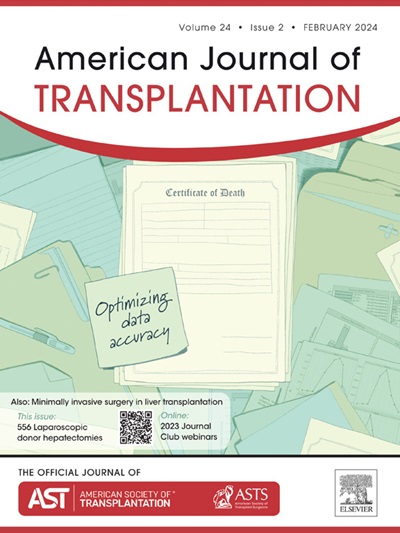持久的混合嵌合体可允许无免疫抑制的后续肠道移植--一项原则性研究。
IF 8.9
2区 医学
Q1 SURGERY
引用次数: 0
摘要
肠道移植(ITx)是治疗肠道功能衰竭的最终方法,但在实体器官移植中排斥率最高,需要大剂量的免疫抑制,感染、移植物抗宿主疾病和恶性肿瘤的发病率也很高。移植耐受将克服长期免疫抑制的需要。我们的实验室利用非柚子消融调理,开发了一种新型猪造血干细胞移植(HSCT)模型,可产生持久的混合嵌合体(MC)和无毒性免疫耐受。我们研究了持久的混合嵌合体是否会促进随后移植的与供者匹配的肠道异体移植物的耐受性,而无需免疫抑制。我们使用具有明确 MHC 的微型猪,在 MHC-Class-I 单倍型错配的情况下进行造血干细胞移植。免疫抑制在第 45 天停止。用流式细胞术评估MC,用混合淋巴细胞反应(MLR)测定评估细胞反应。随后,使用与造血干细胞移植供体 MHC 匹配的供体,在没有免疫抑制的情况下进行了正位 ITx。受者被观察四周后安乐死,以便进行组织采集和机理检测。造血干细胞移植后,受者产生了持久的多系MC和明显的缺失耐受。ITx 后,受者没有出现排斥反应的临床或组织学迹象,嵌合体也没有变化。这些结果证明了产生持久的 MC 以实现移植耐受的潜在价值。本文章由计算机程序翻译,如有差异,请以英文原文为准。
Durable mixed chimerism may permit subsequent immunosuppression-free intestinal transplantation—A proof-of-principle study
Intestinal transplantation (ITx) is the definitive treatment for intestinal failure but has the highest rejection rate among solid organ transplants, requiring high doses of immunosuppressive medication, which is associated with high rates of infection, graft-versus-host disease, and malignancy. Transplant tolerance would overcome the need for long-term immunosuppression (ISP). Using nonmyeloablative conditioning, our laboratory has developed a novel swine model of hematopoietic stem cell transplantation (HSCT) that produces durable mixed chimerism (MC) and immune tolerance without toxicity. We investigated whether durable MC would promote tolerance of subsequently transplanted donor-matched intestinal allografts without ISP. Using miniature swine with a defined major histocompatibility complex (MHC), we performed HSCT across an MHC-class-I haplotype mismatch. Immunosuppressive therapy was stopped by day 45. MC was evaluated using flow cytometry, and mixed lymphocyte reaction assays were used to evaluate cellular responses. Subsequently, orthotopic ITx was performed without ISP using a donor that was MHC-matched to the HSCT donor. The recipients were observed for 4 weeks and euthanized for tissue collection and mechanistic assays. After HSCT, the recipients developed durable multilineage MC and apparent deletional tolerance. After ITx, recipients showed no clinical or histologic signs of rejection, and chimerism was unchanged. These results demonstrate the potential value of generating durable MC to achieve transplant tolerance.
求助全文
通过发布文献求助,成功后即可免费获取论文全文。
去求助
来源期刊
CiteScore
18.70
自引率
4.50%
发文量
346
审稿时长
26 days
期刊介绍:
The American Journal of Transplantation is a leading journal in the field of transplantation. It serves as a forum for debate and reassessment, an agent of change, and a major platform for promoting understanding, improving results, and advancing science. Published monthly, it provides an essential resource for researchers and clinicians worldwide.
The journal publishes original articles, case reports, invited reviews, letters to the editor, critical reviews, news features, consensus documents, and guidelines over 12 issues a year. It covers all major subject areas in transplantation, including thoracic (heart, lung), abdominal (kidney, liver, pancreas, islets), tissue and stem cell transplantation, organ and tissue donation and preservation, tissue injury, repair, inflammation, and aging, histocompatibility, drugs and pharmacology, graft survival, and prevention of graft dysfunction and failure. It also explores ethical and social issues in the field.

 求助内容:
求助内容: 应助结果提醒方式:
应助结果提醒方式:


